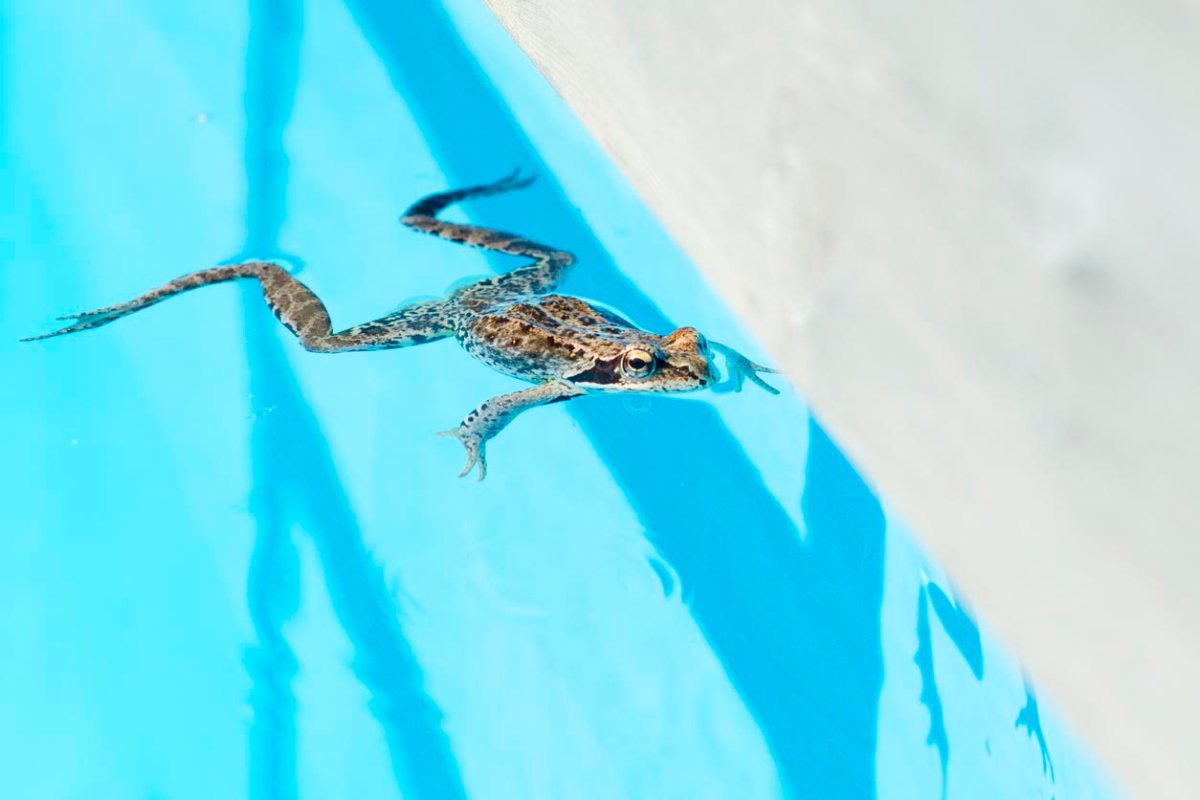

We may earn revenue from the products available on this page and participate in affiliate programs. Learn More ›
Project Overview
- Frogs are drawn to pools because they are typically a source of water and food (in the form of insects).
- It’s a good idea to verify that the frogs on your property are not protected before removing them, and to stick to humane removal practices.
- Some of the best methods for keeping frogs out of pools include installing a pool cover or pool fence, keeping the pool water warm, using natural deterrents like coffee grounds, keeping lights turned off around the pool at night, installing a frog ramp, keeping up with pool and landscaping maintenance, installing a pond elsewhere on the property, and dealing with insect infestations.
- A pest control company can help control insects (such as mosquitoes or flies) near the pool that could be attracting frogs.
Frogs are drawn to backyard pools as a source of shelter and moisture, which can lead to unexpected surprises for homeowners during a summer swim. An open pool can inadvertently become a welcoming habitat for these amphibians, who may use it for breeding or as a haven from the heat.
While frogs in a swimming pool are generally harmless, they can also create unwanted noise and mess. For homeowners wondering “How do I get rid of frogs in my pool?” there are some humane and practical solutions to help get rid of frogs around residential pools and backyards.
Tools & Materials
Bobvila.com may earn a commission from purchases made through these links.
- Gloves
- Pool cover
- Pool heater or solar cover
- Outdoor lighting controls or timer
- Frog ramp (commercial or DIY)
- Pool fence (solid or with fine mesh)
- Coffee grounds
- Lemon juice
- Vinegar
- Marigold, citronella, lavender, or mint plants
- Frog-safe algaecide
Why Frogs Are Attracted to Pools
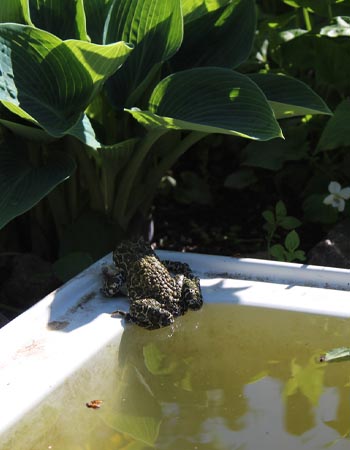
Frogs are naturally attracted to swimming pools, which resemble the still bodies of water they use as their natural habitat. Alicia Toedter, the senior manager of content strategy for national pool and spa care brand Leslie’s, notes, “Pools are ideal because they offer a living space free of natural predators.” She adds, “If your pool has a recurring algae problem that attracts water bugs, or surrounding bright lights attract bugs at night, your pool may be the perfect froggy haven.”
Homeowners who spot these amphibians near their swimming area may also find frog eggs in the pool. “When frogs get a little too comfortable, they may take up permanent residence or lay eggs in the water, leading to an even bigger issue if they hatch into tadpoles,” says Toedter.
Unfortunately, chlorinated swimming pools can be harmful to frogs, as their skin absorbs water and any chemicals present in it. Too much chlorine exposure can dehydrate a frog and cause death, which is another reason it’s important to know how to keep frogs away.
Before You Begin…
Some frog species are legally protected under the U.S. Endangered Species Act due to their vulnerable status in the wild. Handling or harming these species can lead to unintended ecological consequences—or legal penalties. Homeowners will want to check their local wildlife regulations to understand which species are present in the region and if any require special consideration.
To that end, it’s best to stick with humane frog removal and repellent methods, such as physical barriers and landscaping.
Tips for Repelling Frogs
- Use pool covers, fences, and natural deterrents to prevent frogs from entering the pool area without harming them.
- Creating an alternative habitat, such as a pond or moist area in the backyard, can encourage frogs to relocate voluntarily.
- Regularly maintain any plant life around the pool to reduce frog hiding places.
- Controlling insect populations in the yard can deter frogs by removing their food source.
Safety Considerations
- If it’s necessary to handle frogs, wear gloves to avoid potential skin irritation from their secretions.
- Avoid using harmful chemicals that could impact frogs and other wildlife around the pool.
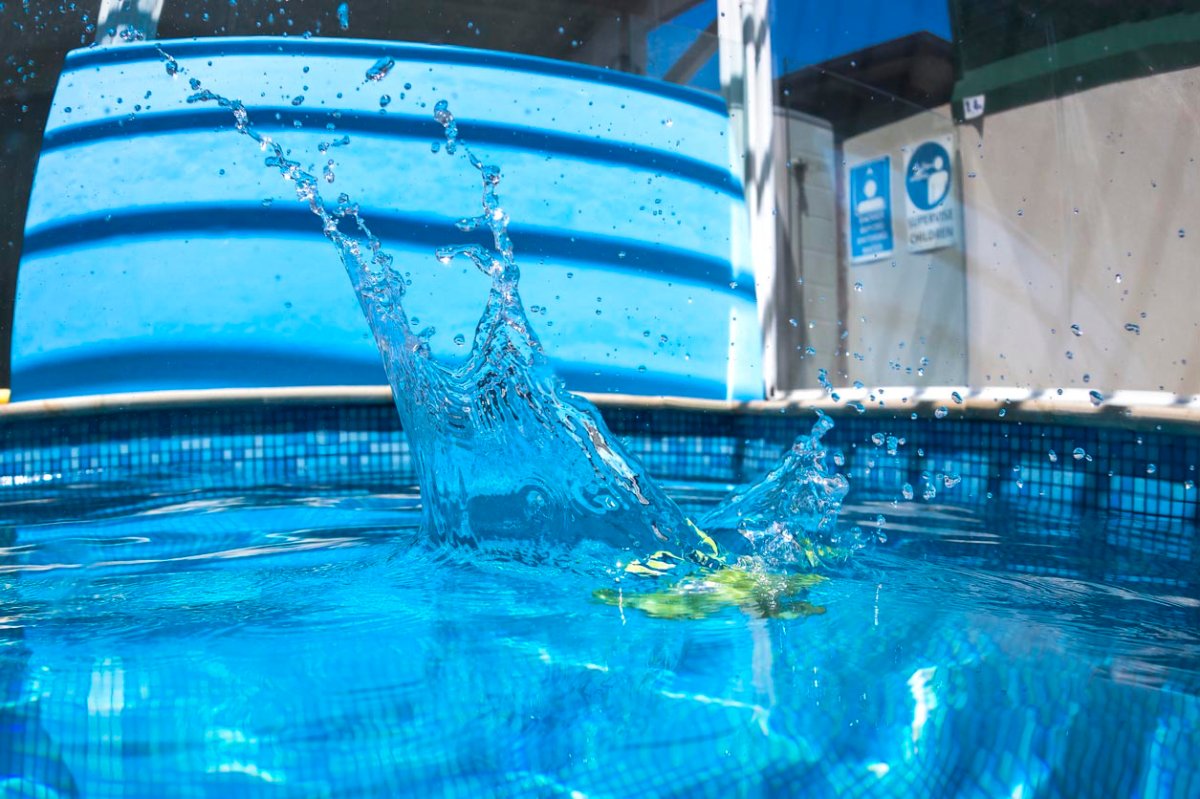
10 Ways to Keep Frogs Out of Pools
So, what keeps frogs away from backyard swimming pools? Fortunately, there are plenty of humane and effective ways to deter unwelcome amphibians and keep the pool area frog-free.
1. Cover the pool with a pool cover whenever it is not in use.
A pool cover can be a valuable tool for keeping frogs—and other wildlife—out of the pool. By covering the pool when it’s not in use, homeowners can keep frogs from entering the water, reducing the likelihood of frogs laying eggs or getting trapped.
“Safety covers and automatic pool covers are the most effective because they fit the pool snugly and don’t allow gaps for your amphibious friends to slip through,” Toedter says. Pool covers also help maintain cleanliness by preventing leaves, insects, and debris from entering the pool, creating an environment that’s less attractive to frogs.
2. Install a solid pool fence around the pool area.
A solid pool fence serves as a physical barrier, preventing frogs from reaching the pool. Ideally, the fence will have no gaps or spaces that could be easily penetrated by small amphibians. A design with a tight mesh or solid panels can create an effective obstacle that discourages frogs from hopping or climbing into the pool area.
Aside from the frog issue, not having a pool fence is a dangerous pool mistake, especially in homes with children and pets. Depending on the size and type of pool, a pool fence costs anywhere from $1,500 to $10,000.
3. Maintain a warm pool temperature by using a pool heater or solar cover.
A warm pool temperature doesn’t just make for a more pleasant swimming experience for homeowners and visitors—it also discourages frogs from lingering around the pool area, as they generally prefer cooler environments.
A pool heater or solar pool cover helps to consistently increase the water temperature, making the pool less attractive to frogs seeking ideal breeding conditions. A solar cover can also serve double duty as a regular pool cover, preventing debris accumulation and further discouraging frogs from approaching.
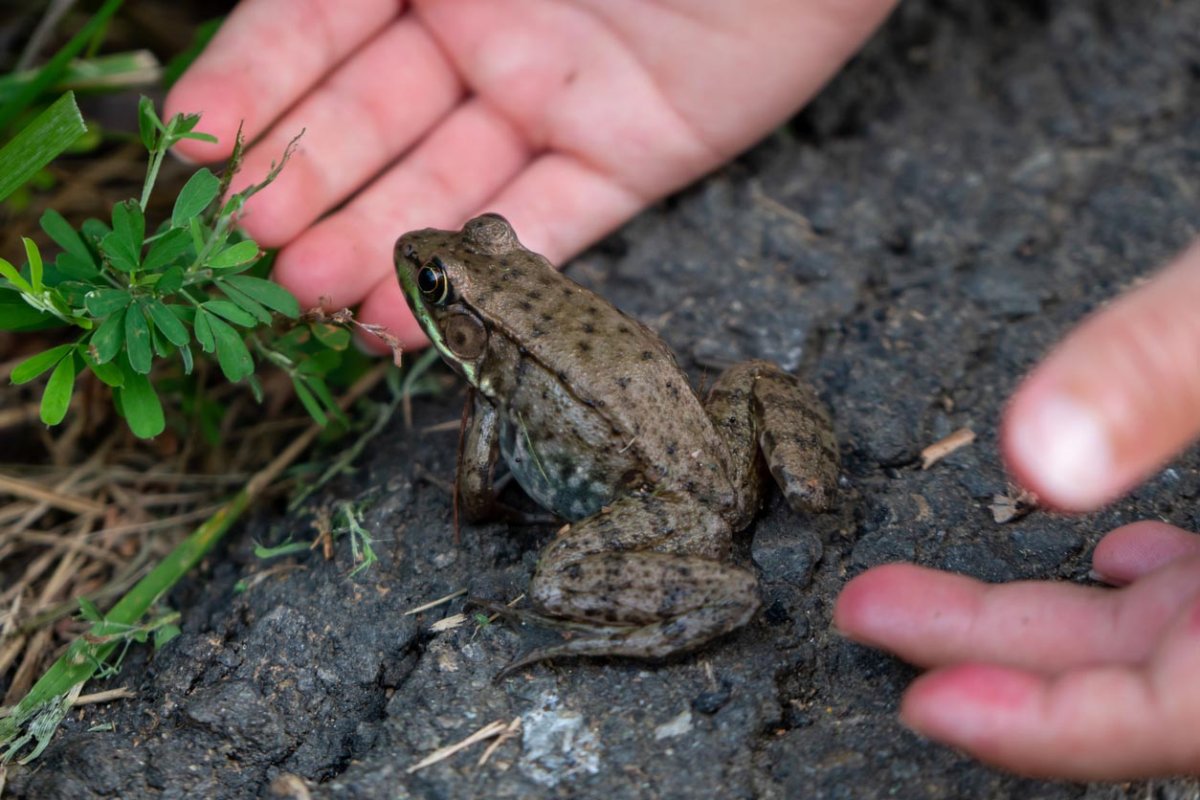
4. Use natural frog deterrents like coffee grounds and lemon juice around the pool.
Natural substances such as coffee grounds, lemon juice, and vinegar can act as a safe and effective frog repellent when strategically placed around the pool area. Frogs are deterred by the strong scent of these substances, which can be spread along the pool’s perimeter to create a barrier.
“Certain plants with strong aromas, such as marigolds, citronella, lavender, or mint, can also repel frogs while providing beautiful landscaping around the pool,” says Toedter. Best of all, using a natural frog repellent for pools is safe for humans, pets, and the environment.
5. Keep outdoor lights near the pool turned off at night when the pool is not being used.
Turning off outdoor lights around the pool at night is a simple yet effective way to keep frogs out of pools. These lights attract insects, which in turn attract frogs seeking an easy food source.
When there are fewer insects drawn to the pool area, frogs are less likely to be attracted to it. One convenient solution is to put pool lights on an automatic timer so you don’t have to remember to switch them off every day. As a bonus, keeping the poolside lights off when the pool is not in use also helps save energy and reduce light pollution.
6. Buy or make a frog ramp so that frogs in the pool have an escape route.
As freshwater creatures, frogs don’t typically like to stay in pools for long. Though they can survive in salt water and chlorine for short periods of time, frogs will often look to escape the pool rather quickly—but aren’t always able to do so on their own.
Toedter advises providing frogs and other wildlife with a way to safely exit the pool to reduce their risk of drowning and absorbing harmful pool chemicals through their skin.
“Set a stick, floating platform, or other escape ramp near the pool ledge so trapped frogs, mice, or other small creatures can safely find their way out after falling into the water,” she says. Frog ramps are commercially available or can be crafted from basic materials at home.
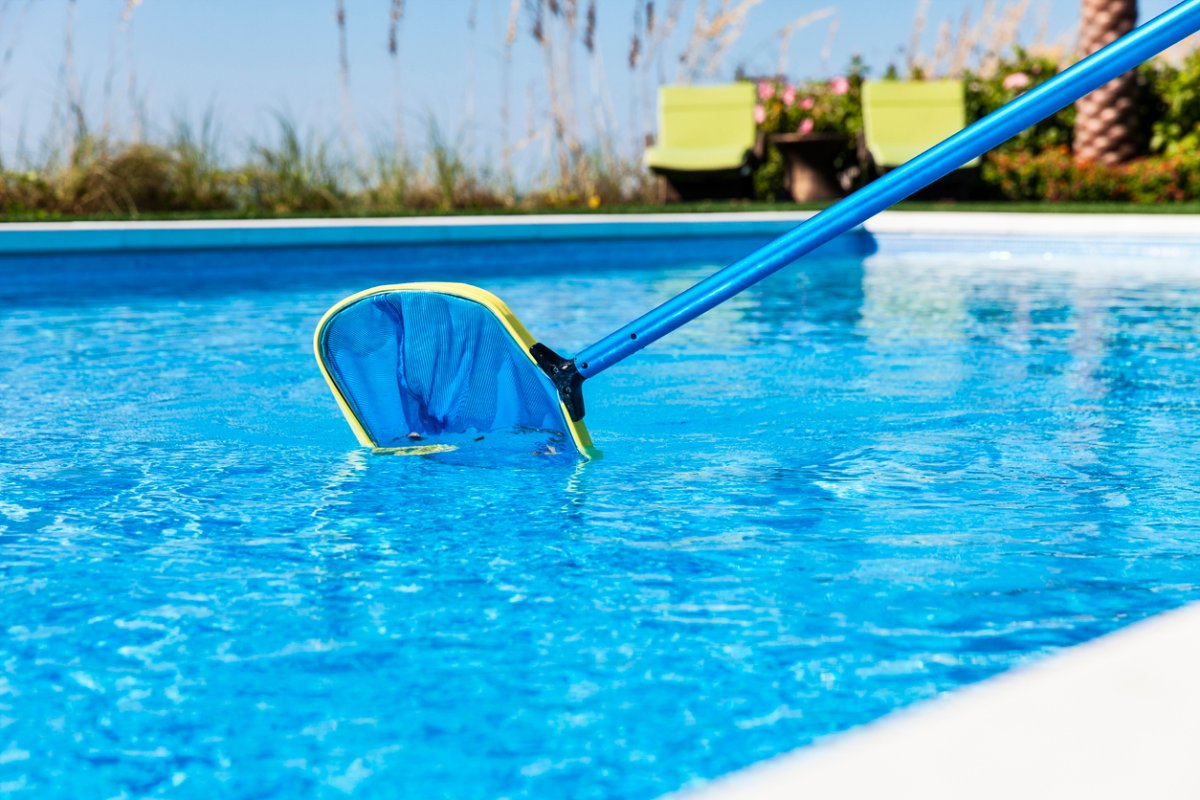
7. Regularly remove algae and debris from the pool as these can attract frogs.
Algae and debris create an attractive environment for frogs seeking food and a comfortable habitat. For this reason, regular pool maintenance is important for keeping these amphibians at bay.
“Keeping the pool clean and free of debris not only keeps the water more inviting for humans, it removes potential habitats for frogs and reduces the risk of bugs and algae, which frogs love,” Toedter explains. She also advises homeowners not to skimp on water care. “Keep up with a weekly water testing, balancing, and shocking schedule to keep the water healthy and less desirable to frogs.”
Homeowners may want to choose their products carefully, as some algaecides can be harmful to frogs and other wildlife. Using natural or frog-safe algaecides ensures that the pool remains inhospitable to algae without negatively impacting amphibians. Homeowners with limited time for pool maintenance may want to consider hiring one of the best pool cleaning services to handle it for them. The average cost of a pool cleaning is about $229.
8. Keep the landscaping surrounding the pool tidy and well maintained to reduce hiding places for frogs.
Well-maintained landscaping around the pool helps minimize the potential for frogs to find hidden refuge. Dense bushes, tall grasses, and overgrown vegetation provide ideal cover for frogs seeking shade and security.
By regularly trimming back foliage and removing excess vegetation, homeowners can eliminate these hiding spots and make the pool area less appealing to amphibians.
Doing so also reduces the likelihood of frogs migrating into the pool from surrounding areas. Those who are short on time or have physical limitations may choose to hire one of the best lawn care services (such as TruGreen or Lawn Love) to keep up with lawn maintenance.
9. Consider putting a pond elsewhere on the property to provide frogs an alternative habitat.
Pools don’t have much in common with a frog’s true natural habitat. A pond with suitable vegetation and ample moisture provides an ideal environment for frogs to live, breed, and feed, drawing them away from the pool area. This allows them to coexist with homeowners in a space specifically designed for their needs while keeping the pool frog-free. Although building a backyard pond can be a bit pricey (the national average cost to build a pond is $3,346), it’s a worthwhile investment if frogs in a pool are a constant concern. Furthermore, it can be a pleasant feature in its own right to add to the property.
10. Control insects like flies and mosquitoes to eliminate frogs’ food source. For the best results, it may be worth hiring a pest control specialist.
In some cases, learning how to keep frogs out of a pool involves removing another pest entirely. Reducing backyard insect populations can deter frogs from lingering around the pool. With fewer available flies, mosquitoes, and other prey, the area becomes less appealing to frogs and encourages them to move elsewhere.
Strategies for effective insect control can involve maintaining clean surroundings, removing stagnant water, and using mosquito repellents or insect traps. For persistent infestations, hiring one of the best pest control companies (such as Orkin or Terminix) may yield the best results, ensuring that insects are managed safely and effectively.
Frogs aren’t most homeowners’ first choice for pool party guests, but home remedies to keep frogs out of pools are ethical and effective ways to control backyard frog populations. From physical barriers to habitat management and insect control, these approaches promote a well-maintained backyard oasis while ensuring any amphibians are safe and protected from harm.
